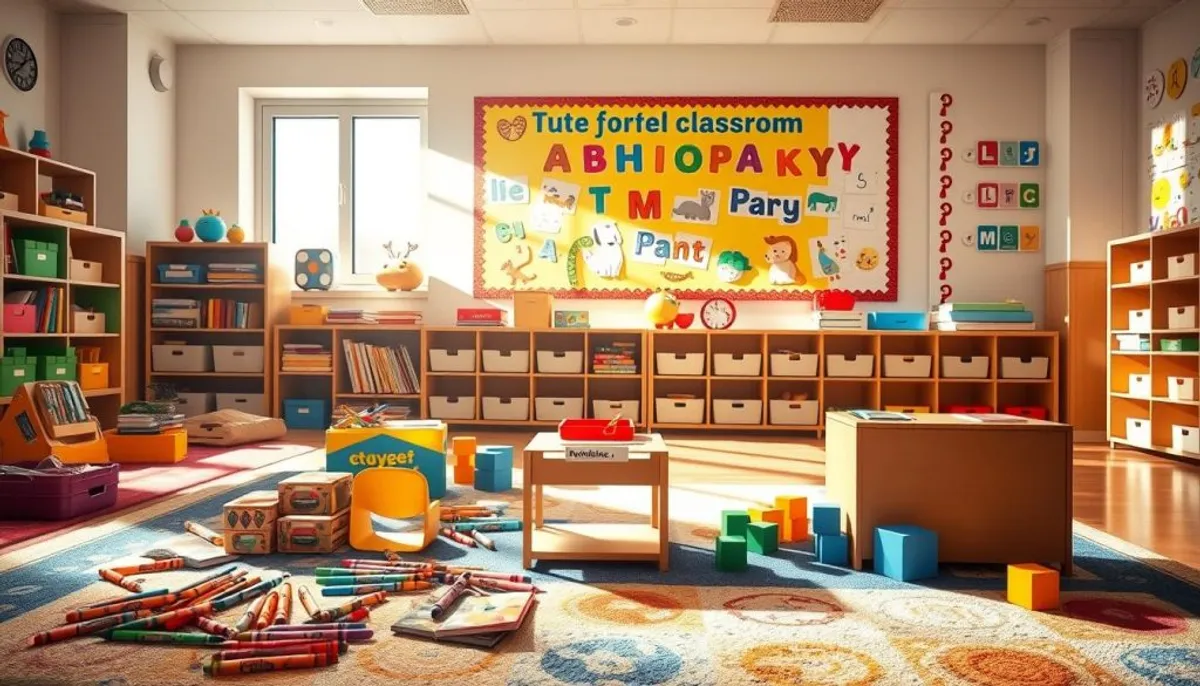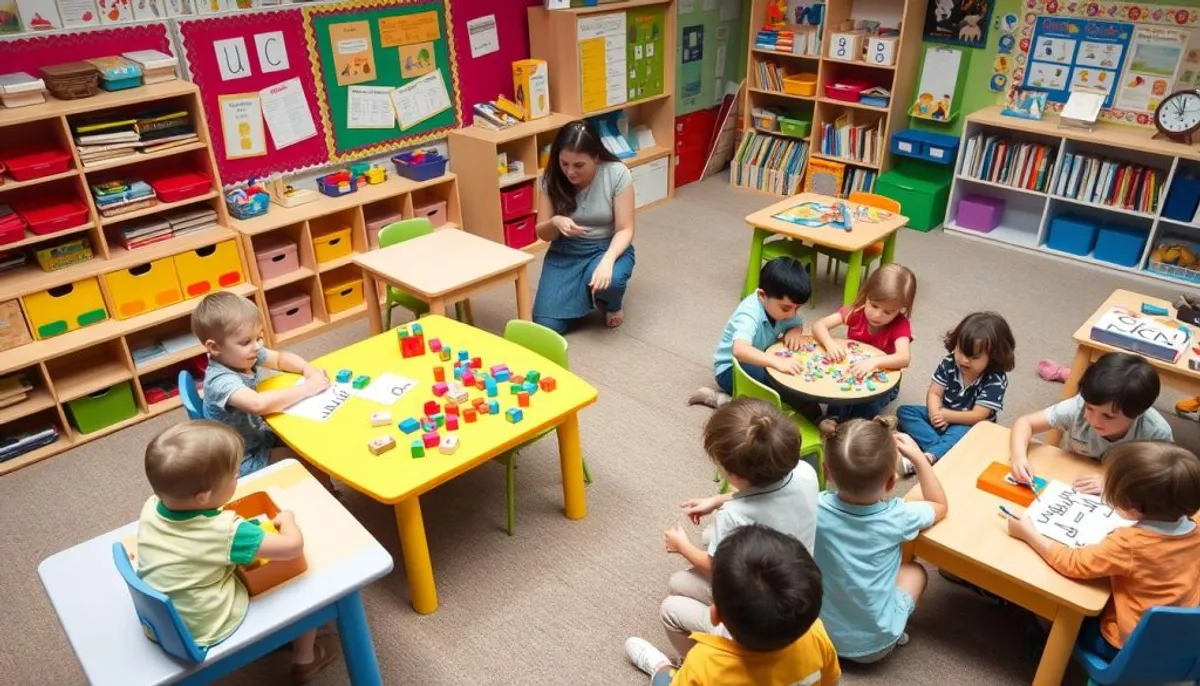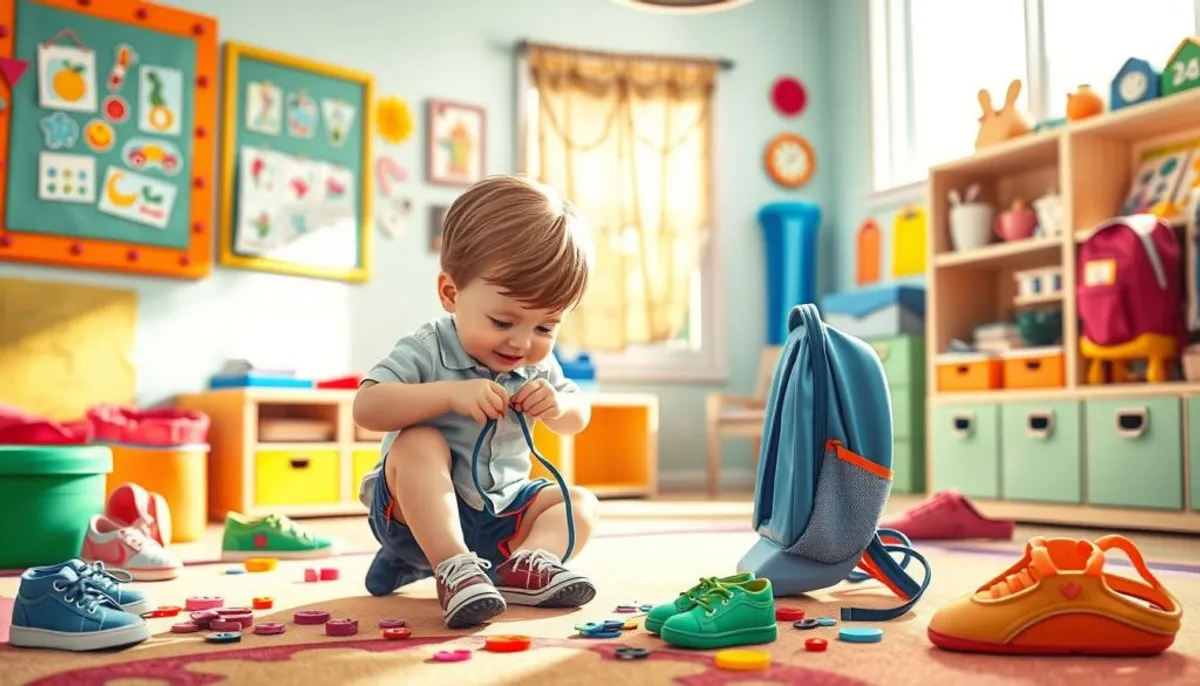Your child’s first step into school life is a big moment. It’s natural to feel both excited and nervous about it. This guide will help you prepare your little one for kindergarten success.
We’ll cover ways to boost their academic and social skills. You’ll learn how to make the transition smoother for your child. These tips will set them up for a great start in their educational journey.

Key Takeaways
- Establish consistent routines and schedules to help your child adapt to the school environment
- Develop essential skills like counting, recognizing letters, and practicing fine motor skills
- Nurture reading and literacy habits to build a strong foundation for academic success
- Foster independence and responsibility to prepare your child for the demands of kindergarten
- Encourage social development and interactions with peers to support their social-emotional growth
Stay Connected with Your Child’s School
A strong bond with your child’s school is vital for a smooth kindergarten transition. Building this relationship offers invaluable support during your child’s first school year. It helps you navigate the exciting journey ahead.
Meet the Teacher Before the First Day
Set up a meeting with your child’s teacher before school starts. Introduce your child and share their likes, strengths, and needs. Discuss your hopes for the year and learn about the teacher’s expectations.
Network with Other Parents
Connect with other parents to build a support system for kindergarten challenges. Schools often have parent groups or committees you can join. This helps you form a community of parents who understand your experiences.
Staying engaged with the school and other parents strengthens school communication. It fosters parent-teacher collaboration and builds a strong support network. These elements are key for a successful kindergarten experience.
Establish Routines and Schedules
Consistent routines help kids feel ready for kindergarten. A solid morning and evening routine ensures a smooth transition. This prep reduces anxiety and boosts readiness.
Set a Consistent Routine Before School Starts
Create a regular bedtime and morning routine. Allow time for dressing, eating breakfast, and packing backpacks. This organization helps kids feel prepared for their day.
Do a Dry Run
Before school starts, take your child on a “dry run”. Show them the school entrance they’ll use. This helps them know what to expect on day one.
Familiarizing your child with the school boosts their confidence. It’s a great way to ease first-day jitters.
Starting routines early helps kids feel at ease. It prepares them for the exciting journey ahead. This setup leads to a positive school experience.
Develop Essential Skills
Kindergarten teachers look for specific skills in new students. These skills form the foundation for a successful school experience. They include academic and social-emotional readiness.
Reach out to your child’s teacher about first-day expectations. Understanding these requirements will help you prepare your child effectively.
Find Out What Skills the Teacher Expects
Teachers often expect students to have certain abilities. These may include:
- Emotional regulation: Ability to manage emotions and behaviors
- Communication: Articulating needs, following directions, and raising a hand before speaking
- Pre-academic skills: Recognizing shapes, colors, and being able to write their name
Work with your child to develop these academic and social-emotional development skills. If your child has mastered these, ask the teacher about classroom challenges.

Preparing your child with essential skills boosts their confidence. It sets them up to thrive in their new kindergarten environment.
Nurture Reading and Literacy
Early literacy is vital for your child’s academic success. Reading aloud to your child is a powerful activity. It helps develop pre-reading skills like phonemic awareness, vocabulary, and comprehension.
Reading aloud exposes your child to storytelling wonders. It builds a strong foundation for their future learning journey.
Read to Your Child
Daily reading aloud has a big impact on early literacy. When you read aloud, you model fluent reading, introduce new vocabulary, and spark your child’s imagination.
Encourage your child to join in. Ask questions, make predictions, and talk about the story. This approach deepens their understanding and engagement with the text.
Engage in Meaningful Literacy Activities
Boost your child’s literacy skills with hands-on activities. Let them help with writing tasks like creating thank-you cards or making shopping lists.
These activities strengthen their writing skills. They also show how reading and writing are connected.
Reading aloud and literacy activities build a strong foundation. They help your child develop essential skills for success in school and beyond.
| Benefits of Reading Aloud | Meaningful Literacy Activities |
|---|---|
|
|
prepare for kindergarten
Starting kindergarten is a big step for your child. It’s crucial to prepare them for this new adventure. This guide will help you set your child up for success in their first year of school.
Develop Essential Skills
Kindergarten teachers expect students to know some basics. These include recognizing letters and numbers, counting, and following simple instructions. Help your child build these skills through fun activities.
Read together, practice easy math problems, and play interactive games. These activities will make learning enjoyable and effective for your child.
Establish Routines and Schedules
Create consistent routines at home to mirror the kindergarten day. Adjust your child’s sleep schedule, mealtimes, and daily activities. This will help them adapt more easily to their new school environment.
Encourage Independence and Responsibility
Teach your child to dress themselves and use the restroom independently. Show them how to pack their own backpack. Give them age-appropriate chores at home to build responsibility.
Nurture Social and Emotional Development
Social and emotional skills are just as important as academics. Encourage your child to share, take turns, and play cooperatively with others. Help them learn to recognize and express their feelings in healthy ways.
Focus on kindergarten preparation, school readiness, and early childhood education. These areas will equip your child to thrive in kindergarten and beyond.
Foster Independence and Responsibility
Help your child develop independence and take on small responsibilities at home. This prepares them for kindergarten expectations. Teach self-help skills like dressing, using the bathroom, and clearing dishes.
These skills give children a sense of ownership over their daily routines. They also instill independence in your child’s life.
Help Your Child Develop Independence at Home
Gradually give your child small chores and tasks. Let them maintain their space and contribute to the household. This builds responsibility and fosters pride.
Encourage your child to make decisions within reasonable limits. This helps develop their decision-making skills and autonomy.
Teach Responsibility
- Assign age-appropriate chores and tasks, such as making their bed or setting the table.
- Provide guidance, but let your child learn from mistakes. This helps develop problem-solving skills.
- Praise your child’s efforts and accomplishments. Reinforce the importance of responsibility and their contributions.
Fostering independence and responsibility at home helps your child thrive in kindergarten. These essential self-help skills set the foundation for success in school.

Manage Emotions and Expectations
Starting kindergarten can stir up many feelings in young kids. It’s crucial to accept their emotions, whether they’re nervous or excited. You can help your child adjust by creating a supportive environment.
This approach will aid in their emotional regulation and help them manage anxiety during this new phase.
Acknowledge Your Child’s Feelings
Don’t focus too much on the upcoming change. This might increase your child’s anxiety. Instead, listen to their worries and thoughts. Let them know it’s okay to feel both excited and worried.
Set realistic expectations about kindergarten for your child. Talk about the fun parts, like making friends and learning new things. Also, mention possible challenges, such as adjusting to new routines.
By addressing your child’s feelings and setting proper expectations, you’ll help them feel ready. This approach will make them feel prepared and empowered for kindergarten.
Hone Cognitive and Motor Skills
Kindergarten readiness involves various cognitive and motor skills. Activities that develop counting, estimation, and measurement abilities boost cognitive growth. Fine motor skills like using scissors and writing tools are crucial. Gross motor skills such as jumping and catching also prepare kids for kindergarten’s physical demands.
Practice Counting Skills
Building numeracy skills is key for kindergarten readiness. Encourage your child to count objects around the house, like toys or fruits. Have them estimate item quantities and then count to check accuracy. Use a tape measure to measure household items together.
These hands-on experiences strengthen cognitive development. They also help kids understand math concepts better. Nurturing fine and gross motor skills is equally important.
Give your child chances to use scissors and color with crayons. Let them manipulate small objects to improve dexterity. Engage them in activities like jumping, climbing, and ball-catching. These skills will help them tackle various tasks in kindergarten.
| Skill | Activities |
|---|---|
| Numeracy Skills |
|
| Fine Motor Skills |
|
| Gross Motor Skills |
|
Encourage Social Development
Kindergarten is vital for building social-emotional skills. Kids need to interact and play with peers. Giving your child chances to socialize helps them learn sharing, turn-taking, and conflict resolution.
Socialize with Peers
Set up playdates, go to library story hours, or visit children’s museums. These activities boost your child’s social development. They can practice peer interactions and cooperative play in safe spaces.
Social interactions teach kids to express emotions and communicate well. They also learn empathy and gain confidence. Problem-solving skills improve as they handle conflicts during play.
| Benefit | Description |
|---|---|
| Improved Communication Skills | Children learn to express their thoughts, feelings, and needs effectively. |
| Enhanced Emotional Regulation | Peer interactions help children develop strategies to manage their emotions and resolve conflicts. |
| Increased Empathy | Cooperative play fosters a better understanding of others’ perspectives and emotions. |
Focus on social-emotional learning and peer interactions. This approach prepares your child for kindergarten success and beyond.
Transition to the School Environment
Starting kindergarten is a big change for young kids. It’s different from preschool or home. Help your child adjust by focusing on joining the crowd and getting into the groove.
Join the Crowd
Kindergarten requires kids to sit still, follow rules, and do group activities. Sign up your child for classes that teach these skills. Dance, music, or sports can help them practice listening and teamwork.
Get Into the Groove
Set up a daily routine like the school schedule. This helps your child get ready for kindergarten. Adjust bedtimes, wake-up times, and other daily activities to align with the expectations of the school day.
These steps will boost your child’s confidence. They’ll feel more at ease with the new challenges of kindergarten.
| Strategies for Transitioning to Kindergarten | Benefits |
|---|---|
| Enroll in structured activities to practice classroom skills | Develops attention, listening, and cooperation skills |
| Establish a consistent morning and evening routine | Helps child adjust to school schedule and expectations |
| Familiarize child with classroom environment and routines | Reduces anxiety and promotes a smooth transition |
Conclusion
Preparing your child for kindergarten involves developing various skills and experiences. Stay connected with the school and establish consistent routines. Focus on essential skills, reading, and literacy while fostering independence and responsibility.
Help your child manage emotions and expectations. Work on cognitive and motor abilities. Encourage social development to build a strong foundation for kindergarten success.
Every child has unique strengths and needs. Celebrate their progress, no matter how small. The path to kindergarten readiness is a personalized journey tailored to your child’s needs.
Take pride in your efforts to prepare your child. Your support equips them with skills and confidence. They’ll be ready for the exciting adventure of kindergarten.
RelatedRelated articles

